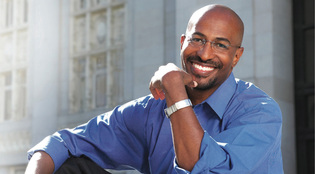 loading
loading
Where They Are NowHelp wanted Richard Hume/ Experience Life MagazineActivist Van Jones ’93JD wants to remake the economy by cleaning up the planet. View full imageAs a leader in the movement for “green jobs,” Van Jones ’93JD contends that Americans need to stop thinking of environmental protection as a drag on the economy. America needs to create jobs to save the environment, he says, and to provide economic opportunities for those who need them. Jones came to this work through more traditional community organizing in the San Francisco Bay area. He is now president of Green for All, a nonprofit group he founded in 2007. His 2008 book The Green-Collar Economy was a New York Times bestseller. Y: What exactly do you mean by “green-collar jobs?” J: A green-collar job is a blue-collar job that has been upgraded to better respect the environment: jobs in energy efficiency, renewable energy production, and organic food. They're often good-paying jobs that don't require a four-year college degree - installing solar panels, manufacturing wind turbines like Rosie the Riveter, planting trees, and doing community gardens. We have two big problems: our economy is melting down, and our polar ice caps are melting down. The way to solve both problems is to re-power America with clean energy and to create millions of jobs doing so. Y: Barack Obama made a speech calling for the creation of 2.5 million jobs rebuilding the infrastructure and developing clean, renewable energy. That must have been music to your ears. J: That was a historic speech because it signals the beginning of rebuilding the American economy on a green Keynesian footing, the idea that the government should spend—even deficit spend—to fight off recessions but also to invest in infrastructure that will make the country much more productive. What we're going to be investing in is clean energy, energy independence, and all the things that are going to help the U.S. go from being a world leader in pollution to a world leader in solutions. Y: Have you met with Obama? J: I've met him a few times. I don't know him well. But the green jobs movement has been feeding into as many politicians and campaigns as we possibly could over the past few years, so you're seeing a lot of echo all over the place. I've certainly had contact with his campaign and his transition team. Y: Do you have any concerns about the economic team Obama has appointed? J: Certainly some of the advisers that are around him, frankly, are architects of the last economy, which just crashed. Our hope is that everybody's paying attention now, and I think people understand that we've got to make a turn back to production, back to thrift, and back to environmental restoration, and that defines the green economy. Y: In your book, you talk about environmentalists moving from David and Goliath to Noah and the ark as an organizing principle. J: Most people who have been attracted to green economics and green ideas in the past period have been on the political left. We have—certainly from the 1960s if not before—a legacy of excessively confrontational politics: we're right, everybody else is wrong, we're smart, everybody else is stupid, and we're going to name, blame, and shame the big evil Goliath bad guys into doing what they should. I think there's definitely a time and place for those kinds of approaches; I just don't think that should exhaust the toolbox, especially given the stakes. And I think where we're trying to go now is much more of a Mr. and Mrs. Noah project, building some sort of a shared ark, for lack of a better term, where we save as much human and non-human life as possible and work together, maybe across old lines of class and color, to get that job done. Y: You also talked about the difference between maximum and minimum demands and gave the example of the civil rights movement—the Montgomery bus boycott versus Malcolm X's call for a complete change in society. J: We have to have a clean-energy revolution in this country. But some people on the green left would be quick to point out that if all we do is fix the energy system then we're going to have solar-powered bulldozers, solar-powered buzzsaws, and bio-fueled bombers, and there's a lot more wrong with our society than just the energy system. We're over-consuming water and resources and a million other things. But we can't go from where we are now to some sort of eco-utopia next Thursday. So the maximum demand—to completely transform the society in a radically green and humanitarian direction—is something one can affirm without saying, everything that is not [eco-utopia] is a mistake or a letdown or a sellout. I think we have to be as sophisticated as the system we are trying to change. Y: One of your key slogans, which comes out of your previous organizing work, is “Green jobs, not jails.” Is the large number of minorities in prison something you see as a rallying point, or is it too leftist or too maximalist to be effective? J: I don't think that most of America would sign onto that tomorrow, but there's a logic here, with regard to the green economy. Fundamentally, the moral claim has to be that if you're going to have a green economy you shouldn't have any throwaway resources, you shouldn't have any throwaway species, and you shouldn't have any throwaway people, and that we shouldn't just have a green movement about reclaiming thrown-away stuff. It should also be about reclaiming thrown-away lives and thrown-away communities.
The comment period has expired.
|
|